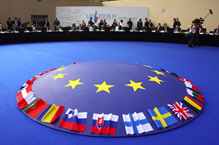
Typical street scene in Santa Ana, El Salvador. (Photo: iStock)
IMF Survey: Constructing a New European Financial Stability Framework
October 20, 2008
- Ongoing crisis demonstrates Europe must be better prepared for bank failures
- Need for new financial stability architecture for the European Union (EU)
- Should be based on shared responsibility and accountability
Europe must be better prepared to deal with bank failures and should use the current crisis as an opportunity to focus on the European Union’s financial stability arrangements, according to the IMF’s Alessandro Leipold.

Conference stressed need for decisive action on Europe’s financial stability framework (photo: Sebastien Nogier/Maxphotos)
europe banking crisis
The IMF has long taken the view that financial integration is crucial to Europe’s growth prospects. But getting there will require an integrated financial stability framework, a move that has been met with resistance in the past.
“Policymakers ought to turn this crisis into an opportunity to have an open, unconstrained debate about the EU’s financial stability arrangements—a debate freed from long-standing national red lines and infused with a greater sense of multilateralism and urgency, and thus leading to policy action,” Leipold said.
Decisive action needed
How should financial stability be managed in an integrated cross-border market? And what does the financial crisis imply for financial integration in the EU? A long-planned but unexpectedly timely conference, organized by the IMF and the Center for Financial Studies on September 26, stressed the need for decisive action on Europe’s financial stability framework.
The conference, which took place in Frankfurt, had over 200 participants representing many important stakeholders in the EU’s financial sector, including regulatory agencies, European institutions, academics, and politicians. A panel discussion on how to strengthen the framework was chaired by Jaime Caruana, Director of the IMF’s Monetary and Capital Markets Department.
Follow the money
According to Charles Goodhart, Professor of London School of Economics, one has to “follow the money” to understand how financial crisis management works. When capital injections are required, ministers of finance take charge. “The minister of finance will ultimately decide whether to bail out a bank or not,” he said, adding that finance ministries have a limited ability to coordinate across borders.
The need for large scale solvency support could result in increased national control over financial systems, which would set back financial integration, Goodhart said. The crisis therefore risked exposing financial stability as a key fault line between the euro area’s centralized monetary policy and decentralized fiscal policy. To counter this risk, limited fiscal federalization for the euro area, and eventually for the whole EU, would be necessary, he said.
Creating a level playing field
One key challenge for Europe is how to integrate financial systems that are rooted in very different legal and regulatory systems. According to Johnny Åkerholm of the Nordic Investment Bank and Inter-Institutional Monitoring Group, this process is “going in the right direction, but painfully slowly.”
He called on politicians to agree on an ambitious vision similar to the one that resulted in Monetary Union, using the Eurosystem’s “hub-and-spokes” setup, which retains proximity between supervisors and financial institutions at the national level while establishing a level playing field and streamlining oversight of cross-border groups.
Monitoring risk
How should cross-border risks be managed in a single financial market? Despite efforts to coordinate the work of the national supervisory agencies, David Mayes from the Bank of Finland said there is still too much scope for supervisory discretion at the country level. He called for a more rules-based system of prompt corrective action, which could give authorities in one country more confidence that other country authorities’ would intervene into a troubled bank relatively early and take it over before its capital is depleted.
Today, cross-border financial stability framework largely consist of memoranda of understanding and ad-hoc meetings, Josef Tosovský, Bank for International Settlements, said, quoting a recent survey. According to Dirk Schoenmaker, Dutch Economics Ministry and VU University Amsterdam, the objective of a stable and integrated financial system in the European Union is at odds with the existence of national financial stability policies. The stability of the EU’s financial system would be in jeopardy in the event of a financial crisis, involving one or more of the emerging pan-European banks, he said.
The way forward
Lorenzo Bini Smaghi, member of the ECB’s Executive Board, and Pervenche Berès, European Parliament, both called for far-reaching reforms of the financial system. But whereas he emphasized the role of conflicts of interest in the financial system, she stressed the need for more stringent regulation. In a reaction from the audience, Professor Jan-Pieter Krahnen, Goethe University and Center for Financial Studies, argued that the causes of the problems must be well understood before major new regulations are introduced.
Views also differed on the degree of supervisory integration that Europe needs: Jonas Niemeyer of Sveriges Riksbank called for much more integration, including possibly the creation of a single European supervisory agency, while Zdeněk Tůma, Czech National Bank, emphasized the challenges faced by host country authorities, and called for a return to greater host country control.
Even though views differed on specifics, most people agreed that the EU’s 27 member countries and Europe as a whole must be better prepared to prevent, manage, and resolve bank failures. And no one doubted that the current crisis would lead to a questioning of the very foundations of modern finance.
Click here for more details, including a list of the speakers and the relevant background materials.
Comments on this article should be sent to imfsurvey@imf.org


